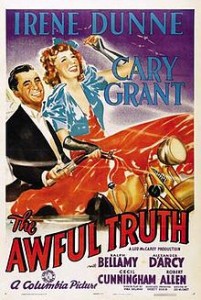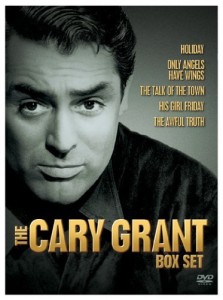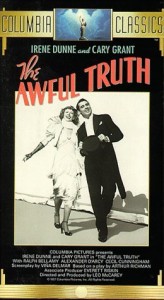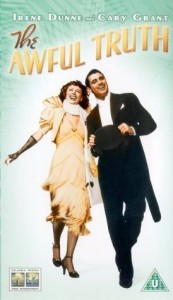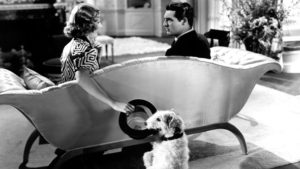The Awful Truth ***** (1937, Irene Dunne, Cary Grant, Ralph Bellamy) – Classic Movie Review 1247
Producer/director Leo McCarey won the 1938 Oscar as Best Director for the awfully fast and funny screwball comedy The Awful Truth, which was nominated for six Academy awards. Irene Dunne kicks up a storm in a dazzling farcical performance clearly lifted even higher by playing opposite the best comedy co-star any actress could ever wish, Cary Grant.
Dunne might not be very well remembered but she was one of the great stars and she and Grant are ideally paired, and they make sweet music together. They play Lucy and Jerry Warriner, a divorcing couple who fight their way back into each other’s arms, even though Dunne’s Lucy is planning to marry rich country boy Dan Leeson (Ralph Bellamy, in a funny and typically unselfish performance) and Grant’s Jerry is planning to marry upper-crust gal Barbara Vance (Molly Lamont).
The soon-to-be-divorced couple perhaps aren’t going to be divorced after all as they are starting to go to incredible lengths to try to ruin each other’s romantic escapades. For this is one of those comedies of remarriage, where couples who have once been married, or are on the verge of divorce, rediscover that they are in love with each other and recommit to the idea of marriage. Other examples include The Philadelphia Story and His Girl Friday, both released in 1940 and both starring Grant.
Like its star, The Awful Truth might not be very well remembered but it really hits the spot. Vina Delmar’s expert and witty screenplay is based on Arthur Richman’s 1922 Broadway play The Awful Truth, filmed before in 1925 (as a silent) and 1929 (as an early talkie with Henry Daniell and Ina Claire), but this is the definitive version. The Awful Truth was remade in colour as the 1953 musical Let’s Do It Again, starring Jane Wyman and Ray Milland.
The Awful Truth was the first incarnation of Grant’s uniquely effective light comedy persona used in many of his subsequent films, catapulting him to worldwide fame. Even so he fought to get out of the film during shooting, since McCarey seemed to be improvising, and Grant even tried to switch roles with Bellamy. Although star and director quarrelled, it didn’t prevent them working together again on My Favorite Wife (1940), Once Upon a Honeymoon (1942) and An Affair to Remember (1957).
Dunne received five Best Actress nominations during her career: for Cimarron (1931), Theodora Goes Wild (1936), The Awful Truth (1937), Love Affair (1939) and I Remember Mama (1948). Grant was nominated twice for the Academy Award for Best Actor (Penny Serenade and None But the Lonely Heart). Neither ever won.
Grant and Dunne also starred together in My Favorite Wife in 1940 and in Penny Serenade in 1941.
http://derekwinnert.com/an-affair-to-remember-grantkerr-classic-film-review-812/
(C) Derek Winnert 2014 Classic Movie Review 1247
Link to Derek Winnert’s home page for more film reviews: http://derekwinnert.com/

